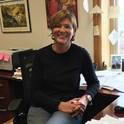On the border of western Iowa, a new landform—the “Loess Hills,” is being created. While scientific discourse surrounding the landform has been on going for a century, “discovery” of the landform by local residents is a recent occurrence, stimulated by socioeconomic changes resulting from the “farm crisis.” As this case study shows, the initial scientific discourse and claims, as presented in a series of publications, established the uniqueness and rarity of the hills in scientific terms. Through a complexity of discursive practices, this internalized scientific community discussion was brought into broader public conversations. Aspects of the discursive practices have been taken on by residents at the local level and appropriation of the “Loess Hills” name and facts attributed to the landform has resulted in reshaping place identity among rural residents and altering the traditional power position within the region, with “hill people” now becoming “Loess Hills People.”
Article
The New Landform’s Here! The New Landform’s Here! We’re Somebody Now!! The Role of Discursive Practices on Place Identity
Rural Sociology
Document Type
Article
Publication Date
1-1-2004
Disciplines
Publisher
Wiley-Blackwell
Abstract
Citation Information
Peggy Petrzelka. 2004. “The new landform’s here! The new landform’s here! We’re Somebody Now!! The Role of Discursive Practices on Place Identity.” Rural Sociology. Vol. 69, No. 3:386-404

Originally published by Wiley-Blackwell. Published on behalf Rural Sociological Society. Publisher's PDF available through remote link.